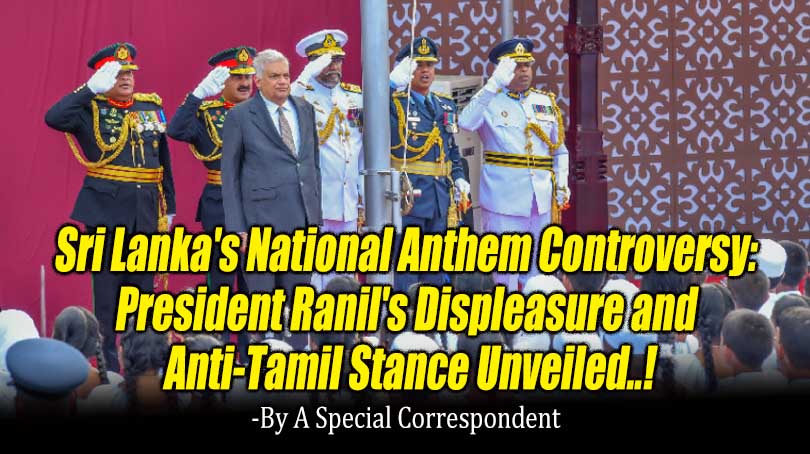-By A Special Correspondent

(Lanka-e-News -06.Feb.2024, 10.30 PM) In 2020, the Sri Lankan government decided to discontinue the use of the Tamil version of the national anthem at the main Independence Day celebration. However, regional celebrations with government involvement in areas with significant Tamil populations continued to include both Tamil and Sinhala renditions, showcasing the country's linguistic diversity.
Sri Lanka's new government, under President Gotabaya Rajapaksa, marked a departure from its predecessor by refusing to sing the national anthem in Tamil, the country's second national language, during Independence Day celebrations. The move diverged from the previous government's efforts to promote ethnic harmony by singing the anthem in both Sinhala and Tamil, especially in the aftermath of a prolonged civil war.
President Gotabaya Rajapaksa, elected with the majority of votes from Buddhist Sinhalese, faced significant opposition from the minority Tamils, who overwhelmingly voted against him. As a top defense official during the civil war, Rajapaksa played a prominent role in defeating the Tamil Tigers, leading to numerous casualties and disappearances among ethnic Tamil civilians.
During the 76th Independence ceremony, President Ranil Wickremesinghe reportedly expressed displeasure at the singing of the Sri Lankan national anthem in Tamil by Tamil and Muslim school children. This incident has sparked controversy, shedding light on deeper concerns about the President's stance on Tamil cultural recognition and minority rights.
Diplomats and attendees observed President Ranil's apparent discomfort as Tamil school children sang the national anthem in Tamil. His facial expressions raised questions about the treatment of the Tamil version of the anthem and broader concerns regarding the recognition of the Tamil language and culture in Sri Lanka.
Despite the official recognition of the Tamil language in Sri Lanka, politicians, including President Ranil, have consistently failed to acknowledge its significance. The deliberate decision to sing the Tamil version at the end of the ceremony, rehearsed after the Sinhalese version, suggests a second-class treatment of the Tamil rendition of the national anthem.
President Ranil, currently seeking minority support for the upcoming presidential election, faces accusations of neglecting Tamil schools and the Tamil educational sector during his tenure as an educational minister under JR Jayawardhana’s Presidency. Additionally, he has been known for discriminatory rhetoric against the Tamil minority.
Further tarnishing Ranil's reputation are allegations of sending thugs from Kelaniya to Jaffna during district council elections. These individuals, reportedly involved in criminal activities globally, were implicated in an incident at the Jaffna library, raising concerns about Ranil's commitment to fair elections and minority rights.
The Tamil community is left questioning whether President Ranil's displeasure during the singing of the Tamil version of the national anthem was an accidental display of insensitivity or a well-rehearsed statement. This has ignited discussions about Ranil's emotional attachment to Tamil grievances and the sincerity of his efforts to bridge the gap between communities.
President Ranil's controversial stand on the 13th amendment, expressed at Sri Lanka’s All-Party Conference, has intensified concerns. He suggested that the amendment is no longer tenable and proposed either its elimination or implementation. His fundamental opposition to a federal solution, comparing devolved powers to provincial councils to those "vested in the London City Council," raises questions about his commitment to minority rights.
Ranil's comments follow the fallout from failed negotiations with the Tamil National Alliance (TNA). The TNA presented an ultimatum with three key Tamil demands, including the implementation of the 13th amendment, release of Tamil-occupied land, and the release of political prisoners. Talks broke down following the government’s failure to provide updates on progress toward meeting these demands.
President Ranil's recent actions and statements have ignited discussions on the broader issues of cultural recognition, inclusivity, and minority rights in Sri Lanka. The incident at the Independence ceremony and Ranil's political stances have raised critical questions about the future of reconciliation in the country
---------------------------
by (2024-02-06 17:54:30)
Leave a Reply